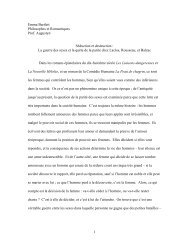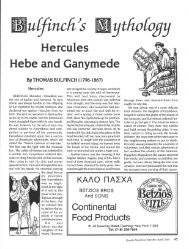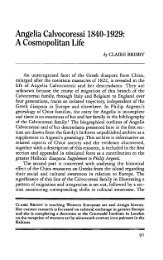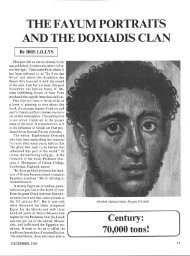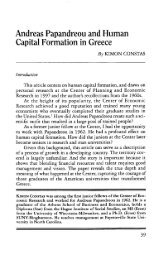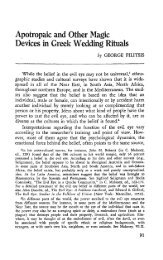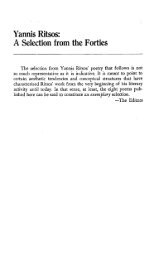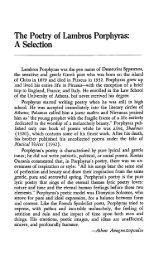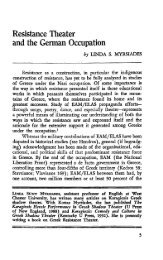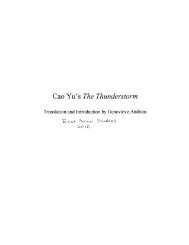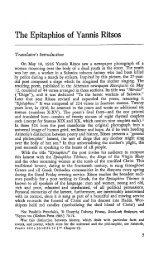Mythistorema - Triceratops Home
Mythistorema - Triceratops Home
Mythistorema - Triceratops Home
You also want an ePaper? Increase the reach of your titles
YUMPU automatically turns print PDFs into web optimized ePapers that Google loves.
26 JOURNAL OP THE HELLENIC DIASPORA<br />
Elpenor"; and throughout Seferis' work he constantly uses imagery and<br />
symbols associated with the journey in general and the Odyssey in particular,<br />
especially when dealing with the subject of love. This identification<br />
of love and the journey becomes very explicit in a number of his<br />
poems. One example is the following passage from "Stratis the Sailor<br />
among the Agapanthi":<br />
The first thing God made is love<br />
Then comes the blood<br />
And the thirst for blood<br />
Goaded by the body's seed as if by salt.<br />
The first thing God made is the long journey;<br />
That house is waiting<br />
With its blue smoke,<br />
With the dog grown old<br />
Waiting, that he may die, for the homecoming.<br />
Since there can be no two "first things," the implication is that love<br />
and the journey are one and the same thing. The poet is using the<br />
long journey as a metaphor for the quest for fulfilment in love, a fulfilment<br />
that is identified here with a return "home."<br />
The same idea is expressed by two lines of poem "10" of the<br />
<strong>Mythistorema</strong> sequence, in which the journey is presented as a failure:<br />
The broken timbers of unfinished journeys,<br />
Bodies that know no longer how to love.<br />
The loss of the ability to love is equivalent here to a journey that ends<br />
in a shipwreck; and in several other poems this identification of love<br />
and the journey is sometimes stated explicitly, though more often implied.<br />
Man's attitude toward love, lust, sensual pleasure, is very important in<br />
his journey through life and determines whether he will end in shipwreck<br />
or home. In many of Seferis' poems, the destination is not reached—<br />
the voyager is trapped by his sensuality and is consigned to the underworld,<br />
where he remains, unlike his <strong>Home</strong>ric prototype, unable to find<br />
his way back home. This is a consequence of Seferis' overall conception<br />
of love and sensuality and the role they play in man's life. In his later<br />
poetry the persona appears on his way to return. In an essay on his poem<br />
"The Thrush," Seferis writes about the role of sensuality:<br />
Those old texts hide solid wisdom. Look, Circe: the senses of<br />
the body, sensuality, send us to the underworld, to the dead,<br />
who can show us the way of return. And it is true that what<br />
we call sensualism weighs a lot, as many examples show, in<br />
the nostalgia and the effort of man for a final liberation that<br />
some call return to a lost paradise and others call union with<br />
God.



